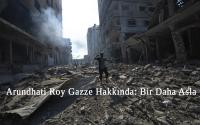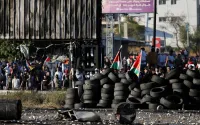Israel's black propaganda bid falters as documents reveal an impotent leader not a terrorist mastermind
Independent9 May 2002
Israel's so-called Book of Terror – designed to prove that Yasser Arafat is a master of terror involved in suicide attacks on Israel – is riddled with errors, omissions and deliberate misinformation.The dossier, which was presented to President George Bush by the Israeli Prime Minister, Ariel Sharon, characterises Mr Arafat as an evil, scheming warlord funded by Iran and Saudi Arabia.But in some cases, translations of Palestinian documents allegedly seized by Israeli troops in the West Bank have been doctored to "prove" Arafat's responsibility for anti-Israeli attacks. At least one "translation" of a Palestinian document posted on the Israeli army's website is a palpable falsehood.In reality the documents portray Mr Arafat's military impotence. The papers the Israeli intelligence service have so far produced – assuming that most of them are genuine – paint a vivid, pathetic picture of his loss of power within the Palestinian community over the past 12 months, the suborning of his lieutenants and the gradual recruitment of his men by Hamas and Islamic Jihad opponents.The original Arabic documents reveal just how the Israelis, in an exercise in black propaganda, have manipulated their true meaning. On 20 March, this year, "Hamdi", one of Yasser Arafat's senior intelligence officers in the West Bank town of Tulkarem, wrote a report about a suspected Israeli collaborator called Jihad Ilayan."Further to our letter numbered TK/334/2002 dated 16/3/02 about the [Israeli] helicopter strike on the chicken farm at Anabta and after arresting the young man mentioned above, interrogating him and then releasing him, we wish to inform you that he is now with a relative named Riyadh Ilayan from the Jalazoan [refugee] camp and he [Riyadh] works in General Intelligence," Hamdi's report said. The implications are obvious. Riyadh Ilayan works for Mr Arafat's own intelligence organisation but his relative Jihad is suspected of collaboration with Israel.Just 17 days earlier, another intelligence report from Tulkarem, this time written on unheaded notepaper and unsigned, informs Mr Arafat's men that the al-Aqsa Brigades in the city are planning "an operation inside Israel". The brigade's modus operandi, says the document, includes offering suspected Israeli collaborators forgiveness if they kill Jewish settlers or Israeli soldiers or intelligence officers. The forthcoming "operation" had been planned, the report states, by Ghanem Ghanem of Force 17, Hani Abu Laimoon, "a previous operative of ours", and an unnamed man who is referred to as a "drug dealer". The same group, the document notes, had previously arranged the attack on a banqueting hall in the northern Israeli city of Hadera. It does not mention the results of that attack: six Israeli civilians dead and another 35 wounded.These reports – and many others – show just how far Yasser Arafat had lost control of the militant organisations flourishing among the Palestinians on the West Bank. But Israel's reaction was to go public with accounts of their contents that were deliberately misleading and, in at least one case, untrue. They claimed that the report on Ilayan detailed his role in a failed suicide attack – when in fact it recorded his suspected collaboration with Israel – while presenting the second document as proof that Mr Arafat's own intelligence men were involved in the al-Aqsa suicide squads. All references to the drug dealer and the inducement to collaborators to seek forgiveness were excised.The Arabic texts suggest that Israel is fighting against men who have long ago passed outside Mr Arafat's control, who are better funded than his Palestinian Authority and whose anti-Israeli attacks can only occasionally be foiled by Mr Arafat's still-loyal intelligence officers.Typical is the case of Mahmoud Freih, a 17-year-old Palestinian schoolboy who was born in Kuwait and lived in Tulkarem. A report from Mr Arafat's "Preventative Security" Office in the city dated 26 December last year informed his intelligence operatives that Freih had originally been a member of the Democratic Front (a Marxist, pro-Arafat group) but had since joined Islamic Jihad at the instigation of a Tulkarem resident called Ayman Mahdawi. Mr Arafat's men demanded to talk to Freih about his change of allegiance. But he was already planning to plant a makeshift mine on a road used by Israeli tanks near Shweikeh. The attack was aborted because of the presence of Israeli soldiers. So he moved the bomb, ran a wire from the explosives to a citrus tree in an orchard. Again, his attack failed. Next day, Freih attended school but returned to the bomb's location – only to find that the wire had been cut. Waiting for him there were an official of the Palestinian Authority and an explosives expert named Samir Abu Naser. He later confessed his activities to Mr Arafat's men. A later note on the report says Freih was released after questioning on condition he had been recruited – presumably by the Palestinian Authority.The story of how a 17-year-old schoolboy could involve himself in Islamic Jihad and head off after classes to try to destroy an Israeli tank casts a revealing light on the militancy of Palestinian youth.The Israeli account deleted all reference to the role played by the Palestinian Authority in foiling the attack on the Israelis. The full text shows clearly that Mr Arafat's men did just what the Israelis would wish: they stopped the attack and persuaded the boy to change sides.In other cases, however, Mr Arafat's intelligence officers woefully failed to maintain the loyalty of their own men. Far from controlling the powerful militias springing up in the West Bank who were intent on an open conflict with the Israelis, Mr Arafat was simply marginalised. A long report, dated 4 February, again written on unheaded notepaper, details for Mr Arafat's intelligence men how the Palestinian security apparatus in Jenin – along with local members of Mr Arafat's own CIA-trained General Intelligence operation – had been infiltrated and bought over with large payments of cash. One of the disloyal intelligence men – "description: skinny, his teeth are parted and dirty..." – is now paid by the Islamic Jihad group, the paper says, "sometimes wears a mask in demonstrations and chants against the Authority. Another man, an officer in the CIA-trained Preventative Security known as "Al-Rikh", is described as "the source of most of the weapons of Jihad and Hamas". The Fatah movement in Jenin, the document adds, is "playing on both ropes ... they are with the Authority but, when the Authority arrests someone, they are against it." Money obviously plays a large part in the suborning of Mr Arafat's men.Israel's attempts to pin Mr Arafat's name to payments for Palestinians who had committed anti-Israeli attacks rest on a few documents which bear – or appear to bear – Yasser Arafat's signature. One of these, dated 19 September last year, is a request for payments of $2,500 to Raed el-Karni, Ziad Daas and Amar Qadan. The Israeli version of this document fails to point out that both el-Karni and Qadan were assassinated by Israeli forces four months later. Daas, who is still alive, is believed to have planned the Hadera massacre in retaliation for the Israeli murder of el-Karni. But the Hadera killings took place on 17 January this year, four months after – not before – the request to Mr Arafat. In the event, each man received $600 each. Another document on headed "State of Palestine" paper, records payments of $800 to 15 men, including Bilal Abu Aamsheh, who was later accused by Israel of killing an Israeli on 31 May, 2001 and two border guards on 11 September the same year. Again, the payments were authorised not after the murders but almost two months before.An account of money apparently needed for weapons production carries the legend "Al-Aqsa Martyrs Troops" on the top of the page. According to the Israelis, it is addressed to Fouad Shabaki, one of Mr Arafat's confidants. But on the printed Arabic original, Shabaki's name does not appear. What the paper does show – yet again – is the huge amount of money available to the men who run the suicide squads. It includes $80,000 for lathes, milling machines, welding machines and wiring. Another paper, entitled "Financial Report" but again showing no Arafat connections, details costs of bullets and chemicals for explosive charges and bombs for al-Aqsa. It provides a startling contrast between the cash available to the suicide squads and the penny-pinching amounts that Mr Arafat apparently doled out.The documents do provide a rare glimpse into the powerlessness of Mr Arafat, the infiltration of his subordinates, the attempts to suborn his own intelligence officers – one of them loyally tells Mr Arafat's spooks that he has refused advances from Islamic Jihad. The last thing they prove is that Mr Arafat is behind the wave of suicide bombings that continued in Israel even yesterday. But that is not what Mr Sharon wanted. He wants Mr Arafat removed from power.So one of the most impotent men in Palestine had to be portrayed as one of the most all-powerful "terrorists" in the world.
http://news.independent.co.uk/world/middle_east/story.jsp?story=293162







